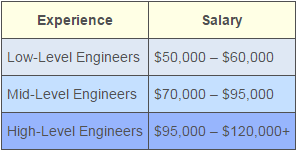At Optimal Networks, engineers are the backbone of our white-glove technology services and we treat them as such.
Below, we’ll walk you through the common salary range for Network Engineers, typical turnover rates, and how we manage to retain our elite personnel.
Salary Range for Network Engineers
Network Engineers certainly have high earning potential, but the amount they make depends, of course, on how much responsibility, experience, and skill they have. In addition to benefits and technical training, compensation tends to play out as follows:

“Generalist” technicians, like ours, are extremely valuable because of their competency in a wide range of technical tasks. Low-level, specialized engineers usually won’t receive high offers because of their limited proficiency/adaptability. However, there is certainly a tipping-point for specialization. When engineers become experts in a particular area, they become highly sought-after. Hosting (Cloud) and Security expertise can significantly increase salary.
Additional Factors Affecting Network Engineer Salary
- Education. Engineering is one of those fields where degrees aren’t required as experience trumps schooling. However, degrees do still help engineers to secure higher salaries and keep their jobs. At Optimal, nearly all of our engineers have degrees.
- Certifications. Basic certifications such as the Microsoft Certified Professional (MCP) certification or CompTIA will not typically increase your salary as an engineer; however, high-level certifications that further your technical specialization such as the Cisco Certified Internetwork Expert (CCIE) certification can actually increase your salary up to 20 percent!
- Environment. The industry and terms of employment also have a big impact on income. For example, contracted Network Engineers can make even more than the amounts listed above, but they do not have the same level of job security or benefits as full-time engineers. In addition, Engineers tend to make less working at nonprofit organizations.
Engineer Turnover Rate
As technology advances, companies tend to lose their technical employees if the work isn’t up to the latest advancements in the tech world. Nonprofits do not usually keep up with the newest technologies, so they experience high turnover for engineers who are looking to learn as much as possible. Virtualization, for example, is something that appeals to most engineers, but nonprofit organizations do not stay very current with it.
Companies with technical employees should expect an 18-24 month turnover — especially as engineers transition from beginner to mid-level and from mid-level to senior.
Optimal’s Retention Strategy for Network Engineers
At Optimal Networks, we want our employees to be satisfied with their professional development and we want them to stay with the organization for as long as possible. We know what matters to Network Engineers and we make sure to include those things in the role. Optimal Engineers can expect:
- Diversity of Work. We place our engineers in a multitude of environments to help them refine their skills. We give our engineers opportunities to solve a variety of problems and gain as much experience as they possibly can.
- Certifications and Training. We pay for our engineers’ training so they can gain the high-level specializations they need.
- Excellent Colleagues. Great engineers want to work with other great engineers. We only hire the sharpest technicians with a wide-range of knowledge.
As you can see, the range of salaries for Network Engineers is very wide, but there is much room to grow in the field. If you’re an engineer or you’re looking to get into the industry, it is very important that you work at the right organization early on. It will have a big impact on the trajectory of your entire career as a Network Engineer.
For more on how our company approaches this position, pop on over to our job openings page here!


